|
3/30/2020 The 14 Holy Helpers: Turning to the Saints During the Coronavirus | COVID-19 ResourceRead NowThe other day I drove past a grocery store that had people waiting in line to get inside and stock up on food and other supplies due to the continuing spread of COVID-19. Most of us have seen pictures of empty store shelves devoid of food and medicine as people make a mad rush to make sure they have what they need to self-quarantine for an extended period.
An equally startling yet vastly different image is that of empty church pews during the numerous Sunday Masses being livestreamed from Catholic parishes around the world. Whereas the emptiness of store shelves suggests the preparedness, albeit over the top at times, of consumers, the emptiness of Church pews suggests the possibility of the Christian Faithful not having the spiritual support which they need during this pandemic. Fortunately, the Church has been through pandemics before, and an examination of our past offers insight for our days ahead. At the outset of the Bubonic plague, commonly referred to as the Black Death, Europe’s faithful sought heavenly aid to withstand the suffering caused by the plague. Various communities invoked the Blessed Mother and the saints for protection against the plague. One of the most interesting and enduring of such devotions comes from Western Germany where 14 “auxiliary saints” were venerated together as the Fourteen Holy Helpers. The Fourteen holy helpers were:
Pious legend tells of a shepherd boy receiving a vision of the 14 Holy Helpers in a field near the German town of Bad Staffelstein. After this, a church was erected on this spot and miraculous healings began to occur on account of the intercession of the Holy Helpers. A shrine church still stands in Bad Steffelstein to this day where pilgrims continue to go and seek the help of the Fourteen Holy Helpers. As this group devotion spread to other countries, new helpers were added for more popular saints in any given region including St. Nicholas, St. Sebastian, and St. Rocco (Roch). Regardless of which saints composed the group of helpers, the people of Europe implored the Helpers’ aid against the harsh symptoms of the Black Death. Today, the world once again suffers from a pandemic, the outbreak of the novel Coronavirus. Though medicine and science have surely advanced and we know much more about diseases and how they spread than medieval Europeans, maybe those Christian faithful of the past can teach us an important lesson: the lesson of faith and trust in God. As we adapt our lifestyles to work from home, social distance ourselves, and view Mass via livestream, let us not forget the great cloud of witnesses who watch over us from heaven. May we turn to their help during these challenging times. Fourteen Holy Helpers, Pray for us! Joseph Basalla is a graduate from The Catholic University of America living in the Washington, DC area.
3 Comments
Can you believe we are already in the fifth week of Lent? Personally, this year’s Lenten season has flown by for me. While I have not always held fast to the Lenten observances I chose for myself, I can already see the fruits of the changes I have been able to maintain. This year for Lent, I have begun working my way through the Bible using a program which breaks the Scriptures into easily-digestible daily segments from both the Old and New Testaments. Most of what I’ve read from the Old Testament so far has been very familiar to me—stories from creation to the great flood and Abraham and his successors. But what has struck me, as I’ve slowly progressed through the books of Genesis and Exodus, is the lack of trust that has plagued the human race since its creation. Reading these Bible passages has often left me pondering why mankind struggles so much to trust God. Adam and Eve fell for the serpent’s lies about the forbidden fruit instead of trusting that God knew what was good and appropriate for them; Abraham tried to jumpstart his promised line of innumerable progeny by having a child with his wife’s servant because his wife was supposedly incapable of bearing any children. Today’s first reading, from the Book of Numbers, continues these themes of distrust. “With their patience worn out by the journey,” the Israelites complain that they were rescued from slavery only to be left to die in the miserable desert, and that even the food the Lord has provided them is disgusting and wretched. I have found these particular stories from the Old Testament striking because they ring true for my own life; when I find myself in a difficult situation over which I have no control, I don’t always maintain my trust in God. I feel helpless because there is nothing I can do to change things, or I cannot fathom why things are unraveling in the way that they are. And, like hundreds of generations of the human race before me, I turn to the world first for answers instead of coming immediately to God. I usually end up complaining, and often times I prefer to question why He is treating me this way and do not trust that there is some good to come out of it that I cannot yet, and may not ever, see. In fact, I think this may be the heart of mankind’s trust issues: one of the hardest things for us to do is to have faith in God when we cannot see the whole picture, or do not understand what is going on, or cannot understand what God could possibly mean by calling us in the way that He does. But we do not need to see the whole picture in order to be faithful followers of Christ. We do not need to control the situation in order to get what God promised us. We can use our times of suffering, or times of feeling excluded from God’s plan, to bring ourselves closer to God. Instead of asking God why He has not done more for us, like the Israelites did in the desert, we can ask Him to show us what good our suffering could bring. And instead of trying to put ourselves on a more equal footing with God, like Adam and Eve or Abraham and Sarah did, we can ask God how best we can serve Him. Today, as we continue to navigate the incredibly difficult situations around us caused by the coronavirus, let us place our trust in God once more and turn to him in our time of need. I pray that this may be a fruitful time of growth in your relationship with God and that we may emerge from this time stronger in our faith, hope, and love. For more resources to accompany you during this time, please visit our Coronavirus Resource page. A month ago, I thought I would be balancing returning back from a service immersion trip and student leadership interviews. Today I sit in my makeshift home office preparing for my next Zoom call, trying to keep in check my own anxieties while still ministering to my students. To be honest, the first week was not easy, and I have still not mastered ministry from home and social distancing. As the days continue, I have progressively realized my need to change my mindset of survival to finding peace, stability, and hope. I went to Thomas Merton and St. Teresa of Avila, my two go to’s when needing to be reminded of where to find God. As I read the words of this Trappist monk and Carmelite nun, it dawned on me that in midst of darkness, fear, and chaos, I have been given an opportunity to create an inner monastery. The lives of these monastic friends of mine shed light on three aspects that I trust and can incorporate into my social distanced day-to-day in order to give me peace and calm my anxieties.
I invite you to share in the wisdom of the monastics and find the opportunity during these challenging times to create within our homes and families an inner monastery. Fears, sickness and hardship won’t be removed, but the insights of our brothers and sisters who have lived this life before us can help us to “recognize the possibilities and challenges offered by the present moment, and to embrace them with courage, faith and hope.” If you find it helpful, here is my Inner Monastery Routine. Finding balance will look different for each person, so take what works for you and make adjustments to fit your needs.
Recently, my life has changed a lot. I had my first child, Vincent Scott Pierno, on January 31st, and he is the greatest joy I’ve ever known. I never knew that becoming a mother could fulfill my life in the ways it has, and I thank God each day for the happiness, tears, and everything in between that he has brought into my life. As a family, we’ve also started house-hunting and looking for a place to settle within this busy and chaotic Washington, DC area. My in-laws will be moving in with us, and although they’ve already been an amazing help with the newborn, it’s another change to our lifestyle. Finding joy in these changes has been challenging at times, but not impossible through the grace of God. I invite you to join me in reflecting on change in our lives and ways to find joy during times of trial and tribulation. One way to work through life’s changes is through Scripture. There are so many examples we can look to that give us strength and remind us of the goodness in change. One is Philippians 4:6-7, which says, “Have no anxiety at all, but in everything, by prayer and petition, with thanksgiving, make your requests known to God. Then the peace of God that surpasses all understanding will guard your hearts and minds in Christ Jesus.” This passage gives me hope. It can be anxiety-provoking to go through so many changes all at once, but Christ gives us strength and we can do all things with his help. Another verse from Joshua 1:9 that speaks of courage during a hectic time is: “I command you: be strong and steadfast! Do not fear nor be dismayed, for the LORD, your God, is with you wherever you go.” In Scripture, we look at examples of people who have also found change difficult and needed support from God. This reliance is the definition of faith: trust and dependence on God through all things, even when the end is not in sight. Another way to work through life’s changes is through prayer. In prayer we can develop a closer relationship with God, and in this dialogue find joy in knowing Christ more deeply. Prayer can be done in many ways: silently, out loud, in reflection, through journaling, and even through participating in the Mass regularly. Since prayer is “both personal and communal,” we can encounter Christ however we feel most comfortable. I’ve found that the most important part of this prayer is not to always ask God for things, but to offer thanksgiving and to listen. The “listening” is the hardest to do. The chaos of a busy and a constantly changing life makes it even more difficult during challenging periods to take time and listen to God. However, it is in those hard times that we can deepen our relationship with Him. The final way I’d really like to impart is by keeping track of and celebrating joy. In this age of social media and 24/7 news updates, it’s easy to see so much negativity all around us. People gossip about others, worry about things that have nothing to do with them, troll people online for their own enjoyment, and trash talk things that people don’t need to even have an opinion about. This negativity can seep into our daily lives and we can get lost in it. I invite you instead to be a whirl of positivity. As Catholics, we are called to action by being missionaries in the world. St. Vincent Pallotti suggests this in his teachings, and brilliantly states this saying, “Remember that the Christian life is one of action; not of speech and daydreams. Let there be few words and many deeds, and let them be done well.” I find his words timeless. The deeds that Pallotti refers to can be simple ones, such as celebrating anything good that comes into our lives by posting it on social media or encouraging joy in the lives of others. We could truly create small havens of joy for people to encounter by simply finding the joy that already exists. Share this joy and gratitude with at least one person, whether in-person or online. Some examples from my life include sharing in my son’s new life and looking for the good in being home with him rather than the stress. Even something as easy as a smile could change someone’s day. I invite you to use these hashtags when you post about your joys as we get through this life together in Christian spirit! #joyinChristianaction #findingjoyineverything #discoverjoyfulmoments There’s something wonderfully intimate about entering an empty chapel or secluded church and embracing it for personal prayers. Our Lord continuously invites each of us to set aside our daily activities and distractions to spend some time gazing, discerning, and listening to Him who knows each of us better than we could ever understand ourselves. The ancient promise of Christ to “Come to me, all you that are weary and are carrying heavy burdens, and I will give you rest” assures us of the great love freely offered to us when we recall we are always in God’s holy presence. In doing so, the troubles and challenges we face in the world are trivialized and surrendered to God’s holy will so that our focus can be firmly fixed upon worshipping and honoring the One who calls us to Himself.
Whether it was in a parish church during the day, the school chapel in between classes, or even the private chapel of a religious community, my experiences of being able to utilize the simple intimacy and quiet of the moment offered me peace and sanctuary from the world. Of course, the Almighty is not restricted to the tabernacle of a church; His presence is infinite and forever available to us. There is, however, something affirming about entering into a space conducive to prayer and spirituality. The design and furnishing of a sacred space can draw our senses into an experience to better appreciate God’s presence in our lives. The light from outside may reflect colored light from stained glass windows upon the wall, the smell of candles or incense being burned convey that space is specially oriented to a higher purpose than what you just stepped out of, and the silence and lack of technology, advertising, or electronic distractions enable you to be more aware of your surroundings as you seek to hear God speaking to you. Encounters with the living God are not typically a Burning Bush or Annunciation experience; recall that the prophet Elijah sought to encounter God on Mount Horeb and found Him in the “sheer silence” rather than a strong wind, fire, or earthquake. We are all aware of the daily bombardment of digital content and of the professional, social, or academic obligations and expectations we face. They compete for our time and attention, can wear us down in routines, and force us to prioritize what is important for us to achieve. In our busy lives, we must actively choose to answer God’s constant and gentle call to “Abide in me as I abide in you.” He pours out His love for us freely, even when we are not always actively seeking Him or discerning His will for us. The Christian journey, then, is one of encounter and service; the love God extends to us is to be shared and offered to our neighbors, the marginalized, and even—especially—enemies. No matter our vocation in this life, our ultimate goal must be Heaven in the next. The saints are excellent role models in embracing the love of Christ and committing their lives to bringing that love to others. And while there is something beautiful about being the only person before the Lord in prayer and adoration, there is an even greater joy in bringing others to share in the experience and to worship God together. We do not walk the Christian way alone. As a wise friend of mine observed: "[W]e have to remember that the journey to heaven is not a solo trek. You seek to bring everyone with you. If one person falls, you travel to him or her, and help them get up, and you carry along together towards the destination. This is what God has entrusted us to do, to reveal such love as His love. Within our families, jobs, school, or wherever God calls us to be, we must give everything of ourselves in bringing others on the adventure, and helping them endure. Think of the image of exhaustively falling down on God’s doorstep after the journey is over. You look back, and see no one, because the ones traveling with you have gone inside already.[1]" [1] Joseph Cuda (lecture, Knights of Columbus Council #9542 business meeting, Washington, DC, November 3, 2013). http://knights.cua.edu/res/docs/Knights-Lecture-5-November-3-2013.pdf O God, Thou art my God, I seek Thee, my soul thirsts for Thee; my flesh faints for Thee, as in a dry and weary land where no water is. -Psalm 63:1 There are seasons in the spiritual life in which you feel parched, as if you’re wandering the desert without refreshment. Silent reflection is filled with distraction. Prayer seems awkward, difficult, or boring. Your heart feels lifeless. Lately, despite my attempts to find escape, this sums up my prayer experience. It doesn’t matter that I infuse my days with the Mass readings, a Rosary, Catholic podcasts, or spiritual books. Right now, it seems so much easier to turn on a show or scroll through social media than to pray. Any time I resolve to do the latter, all the things I need to do bombard my mind, or the texts and notifications come in streaming. At Mass, I hear the beautiful words of Scripture and the homily but feel hollow in the pew. Am I a bad Catholic? Is something wrong? During times like these, many people of faith get disheartened. They think they have done something wrong in the spiritual life, that God has abandoned them, or that their faith must not be relevant anymore. But all people of faith will experience this to some degree at one point or another! It is often hard to trudge through when warm feelings are absent and prayer requires intentionality and effort, but these times in the spiritual life can be the most fruitful of all. Our hearts can grow cold and tepid for two reasons: either we’ve slackened in the spiritual life and slowly let the cares of the world take over – like the weeds that choke out the good seed in the parable – or God is calling us to deeper faith and growth. If it’s the latter, this is often a time of spiritual maturation that deepens our faith and love. We choose to cry out to God in prayer not because it makes us feel good or holy or satisfied, but because we trust in God and love him despite how we might feel. We’ve often heard that love is a choice, not a feeling. Therefore, when feelings are absent, God is inviting us to choose him with a love that is selfless and trusting. The feelings that are lukewarm, indifferent, or distracted are part of the spiritual dryness St. Ignatius of Loyola called “desolation.” According to St. Ignatius, there are moments in the spiritual life of both consolation and desolation. In times of consolation, we feel especially close to God, find prayer easy, fulfilling, and natural, and have peace and joy. I remember one time talking to a priest in spiritual direction who asked how things were going spiritually. I told him I almost felt guilty because all was going smoothly. He chuckled and told me to enjoy this time of consolation because it wouldn’t last forever—advising me to write down my feelings and spiritual observations as something to look back on in times of dryness or sorrow. A quote attributed to St. Philip Neri sums up this ebb and flow: “As a rule, people who aim at a spiritual life begin with the sweet and afterward pass on to the bitter. So now, away with all tepidity, off with that mask of yours, carry your cross, don’t leave it to carry you.” How can you carry your cross during this time? Below are some tips to reinvigorate your faith and get you through this time of spiritual dryness.
It is important if you feel indifferent to your faith right now not to give up. I encourage you to re-double your efforts in prayer, seek help from your community and the saints, and persevere. Know that this is a completely normal phase of the spiritual life, that even the saints felt arid at times, and that you are not alone. As a PhD student, there are often many moments where I find myself buried under work, exhausted from studying, and wondering if subjecting myself to a five year program of studying, teaching, and writing is worth it. Although I love what I study and find it extremely life-giving, there are plenty of moments when I’ve felt hopeless, isolated, and anxious about a future career in academia. This past year, I found myself struggling in the midst of my third semester in my program. I felt emotionally and mentally exhausted by the demands of being a second-year student and teaching assistant. Frustrated, worried, and tired, I made an appointment with one of my professors, hoping that venting to someone who understands the challenges of academia might at least help somewhat. As I vented about my anxieties of being an effective teaching assistant, distinguished student, and successful future academic, my professor patiently listened. Even as my concrete worries about grading and lecturing for the first time began to turn into catastrophizing about never being hired at a college or university, my professor sat with me until I finished talking. She never minimized my feelings or invalidated my emotions. Instead, she shared with me her own challenges that she faced as a graduate student. Through stories about her own experiences, she admitted that she had been where I was, too. My professor didn’t let the conversation remain at a place of despair; she instead encouraged me to look at the bigger picture in all of these difficulties: God’s plan for each of us. She challenged me to think about my own vocation to be a graduate student and reminded me that it was God’s will that I was here. My professor helped me to see that despite my anxiety and worry, I was not alone. Not only did I have her support and the support of others at my university, but my present and future rested in the hands of my Creator. She also helped me notice places in my life where I was successful, and suggested places where I could become stronger. After talking about my strengths and areas of improvement, she offered advice, pointed me to other people that might also help, and offered to continue the conversation whenever I needed it. I left encouraged, feeling supported, and with a new perspective on my life as a graduate student. When I first scheduled my meeting with my professor, I had only expected to give voice to my worries to someone who knew what I was talking about; however, when I left my meeting, I felt that I was no longer walking alone on my path. My professor was walking with me, accompanying me on my journey as a graduate student. Upon later reflection, this moment of accompaniment shared with my professor reminded me of Jesus’ own style of accompaniment on the Road to Emmaus (Luke 24:13-35). Like the disciples who were dejected, disillusioned, and confused about the events that had taken place in Jerusalem surrounding Jesus’ death, I too was anxious about my own life as a graduate student. My professor offered a presence of patient listening, even when my worries began spiraling into despair. Instead of invalidating my response to the challenges of my life, my professor, like Jesus, “drew near” (Luke 24:15) to me by sharing with me her own difficulties as a graduate student. My professor also helped me to shift my perspective. She imitated Jesus on the Road to Emmaus by reminding me of God’s role and plan in my life, encouraging me to look beyond the challenges of the present moment. Finally, my professor helped me to remember my own sense of mission and vocation, and move actively towards them. As Jesus interpreted the scriptures with the travelers on the way (Luke: 24:27), my professor assisted me in reading God’s revelation in my own life through my strengths and weaknesses, encouraging me to develop and strengthen my gifts in order to respond to God’s call. As Jesus walked with the disciples towards a definitive direction, my professor was walking with me towards a certain goal: greater trust in God and more freedom from anxiety in order to live out my vocation. After this moment of accompaniment with my professor, I continued on my path as a graduate student with a new sense of support and encouragement. Like the disciples after their own powerful encounter of accompaniment with Christ, I too returned to my own mission as a graduate student, but with renewed hope and enthusiasm. My experience of being accompanied by my professor made a significant impact on the way I think about my own life and vocation. In that simple meeting, my professor reminded me that no one lives out their vocation and personal mission in isolation. Instead, we need one another on this pilgrimage towards full realization of being the beloved of Christ. Accompaniment allows us to walk together towards Christ; it turns the challenges of the journey into opportunities to discover God’s love with and through one another. Who might accompany you on your journey towards Christ? How can you accompany others through challenges that you’ve faced? For more resources on mentorship and accompaniment, please click here.
The Gospel reading for the Fifth Sunday of Lent is the familiar passage of the adulterous woman and her accusers. For as long as I can remember, this story has been bittersweet: it involves targeted harassment and shame, but also redemption and conversion. At this point in Lent, I don’t think there is a more needed, or relatable, lesson for us to be reminded of and to work on accepting. So, we’re five weeks into our Lenten journey. We’ve been skipping meat on Fridays and trying to live without whatever convenience or vice we decided to give up or purge from ourselves. Maybe we’re praying a little more than we normally would or are setting aside a few minutes to read a daily reflection from those little black books left in the back of our churches. But even with all of these intentional and humbling acts and motivations, we often still feel unworthy or like we’re faltering. Because of this, it’s possible to say that we don’t even need the Pharisees to judge us and bring us for judgement before God – we’re doing it enough for ourselves. To overcome this, I want us to reflect on three things: personal attitude, an open heart, and recognizing what’s in front of us. I think sometimes we’re too hard on ourselves. We allow our own harsh judgements to replace the only one that truly matters: God’s. Our own personal attitude can prevent us from accepting and sharing in the love and grace of God if we constantly feel that we are unworthy or failing. In the Gospel, when the adulterous woman is brought before Jesus, it does not say that she cried or tried to run. In the Gospel account, she lays at the feet of Jesus, lets Him clear her name and, ultimately, lets Him forgive her sins. Here’s a secret I’ve learned that the Gospel has been trying to tell us for a few thousand years now: Man is never worthy on his own, but has been made so by Christ, who offers redemption to all. If man were worthy, Christ would not have needed to redeem us after the Fall. So, we need to stop allowing our own negative perception of our efforts to prevent us from bearing or receiving the fruits of God’s grace and forgiveness. Why was Jesus’ reaction effective with the woman? Christ did not condone her sin, but met the woman in her sinful situation with love and mercy. Surely, such a transformation is not possible without a profound encounter with God’s mercy, an openness to change, and conversion of heart. The adulterous woman of this week’s Gospel is told by Jesus to “Go, and from now on do not sin any more” (John 8:11). As a result of her encounter with Jesus, her heart was changed, and she spent the rest of her life trying to grow closer to Him. We are called to do the same – during the Lenten season or any other time. If we are open to the love of God, it will fill us and strengthen us in our actions. With a faithful attitude and a heart that is open to change, all that is left is for us to encounter God. In order to do this, we must recognize what is in front of us. In the challenges, relationships, beauty of nature, art, and moments of prayer, God is entirely present and inviting us to share in it with Him. What a beautiful gift, and how accessible and truly joyful this is for us! I want to suggest that each of us take a few moments each day this week to reflect on how we’ve gone out of ourselves to be with or grow closer to God. Instead of grumbling about how much we miss Netflix or those amazing chocolate caramels, be proud of yourself for being so committed to your solidarity with Christ and His own suffering. Or, if you tripped up, instead of getting frustrated with yourself, reflect on the three Stations of the Cross in which Jesus falls. Absolute perfection is never what God expects or even desires – He’s just pleased to recognize a desire in us to do better. For more resources to accompany you along your Lenten journey, please click here. Question for Reflection: How can you grow closer to God in the final days of the Lenten season? Editor's note: This blog was originally published in 2013. We are re-posting it in honor of the two upcoming Marian feast days on September 8 (the Nativity of Mary) and September 12 (the Most Holy Name of Mary). Blessed Mother, pray for us!
Both of my grandmothers had great devotion to the Blessed Mother. I remember going to their homes and seeing statues of Mary and other saints, prayer cards, and crystal and silver rosaries. I learned much from them and my mother about devotion to the Blessed Virgin Mary. Back in 1901, on this day, the feast of the Most Holy Name of Mary, my grandmother, Millie Donio, was born. During my childhood, though, I did not know that it was a feast day, because with the reform of the liturgical calendar in 1969, the feast was removed. Restored by Blessed John Paul II in 2002 in the revised Roman Missal, it is now an optional memorial. Interestingly, there is only one other feast related to the name of a person, the Most Holy Name of Jesus, celebrated on January 3rd. This feast day was restored in 1996. The name, Mary, could mean “sea of bitterness” or, possibly, “beloved”. Consider for a moment how many situations Mary found herself in that could have resulted in bitterness. When the unwed young Mary was told by the angel Gabriel that she was pregnant by the “power of holy Spirit,” she did not focus on her own situation, but made herself available to her cousin Elizabeth (Lk 1:39-40). When her son, Jesus, went off preaching suddenly at age 30, the scriptures show no evidence of her complaining about it. Instead, she says, “Do whatever he tells you” (John 2:5). No bitterness there. When she is at the foot of the cross watching her son die before her eyes, powerless to do anything about it, she accepts being given over the care of the Beloved Disciple, he as her son, she as his mother (John 19:26-27). Sorrow, yes. Bitterness, no. A “sea of bitterness” around her, but she, being the perfect disciple, shows us the way to be. She shows us how to live as beloved by God. My grandmothers showed me how to live as one beloved by God. They each had their various hardships in life – physical sufferings, emotional difficulties, financial challenges – but each held firm to her faith and it was faith in God that sustained them. They each moved outside of themselves and cared for others, even in the midst of their own struggles. I will never forget going with Grandmom Donio to quietly drop off bags of fruits and vegetables at the back doors of the homes of people she knew were in need of them, but were not able to ask others for help. No words exchanged, we were not even seen, just an action done for good because the other is beloved by God. Being beloved by God does not mean there will be no suffering or challenge in life. Being beloved by God, called by our name in Baptism, which claimed us for Jesus Christ, we are not left alone to simply move through life. We have the ones we call by name, Mary who intercedes for us with the other person we call by name, Jesus, who is also the Son of God. We call also on the names of the other baptized in the community of faith, the Church. We call out with all of our needs as we live in what can seem at times like a “sea of bitterness.” But, we are not meant to be bitter in life, no matter what we experience. Pope Francis offers us encouragement to move out of ourselves toward others: “Let us never yield to pessimism, to that bitterness that the devil offers us every day; let us not yield to pessimism or discouragement: let us be quite certain that the Holy Spirit bestows upon the Church, with his powerful breath, the courage to persevere and also to seek new methods of evangelization, so as to bring the Gospel to the uttermost ends of the earth (cf. Acts 1:8)” (Audience with the College of Cardinals, March 15, 2013). What are we to do then? Not live in bitterness, but witness as ones beloved. We are to call others by name and assist them in being good disciples of Jesus Christ, following the pattern of life and asking the intercession of the one called Mary. Editor's Note: This article originally appeared in the September 6th, 2018 edition of the Catholic Apostolate Center's eNewsletter.
It is no secret that the Church is facing turbulent times. The Catholic Apostolate Center would like to express deep and heartfelt sorrow to all victims of clergy sexual abuse. Our Director, Fr. Frank, will be offering a Novena of Masses for Victims of Sexual Abuse from September 7 to September 15 (Memorial of Our Lady of Sorrows). We invite all to join us in prayer. It is important to care for those who are suffering and to remember self-care. If you or someone you know needs information, support, or resources regarding stress and trauma, we invite you to our Self-Care for Healthy Ministry Resource Page. There, you can find resources from SLIconnect, the education ministry of Saint Luke Institute. You will be directed to the following resources:
Please use the virtue of prudence to determine if a licensed and/or medical professional should be involved when dealing with stress and trauma. In these difficult times, the Church will move forward with an increased role of the laity, which will require greater co-responsibility and collaboration among the faithful with clergy. Our Collaboration in Ministry Resources unpack what healthy and fruitful collaboration looks like. On this resource page, you will find many talks, blogs, articles, websites, podcasts, and more, all aimed at maximizing the resources in the Church in a healthy and productive way for the salvation of souls. You can listen to our new podcast on co-responsibility by clicking here, and you can view our Collaboration in Ministry Resources by clicking here. Finally and most importantly, we must remember that our faith life is in Jesus Christ and through his Church. To properly orient ourselves, we invite you to study the message of Pope Francis in his third Apostolic Exhortation, Gaudete et Exsultate (Rejoice and be Glad). Pope Francis seeks “to repropose the call to holiness in a practical way for our own time, with all its risks, challenges and opportunities (GE 2).” We encourage you to visit our Gaudete et Exsultate Resource Page to read this timely exhortation, and to find media and other resources to help you distill the Holy Father’s call to holiness. A Facebook Live event with Fr. Frank is particularly helpful and can be viewed by clicking the image, or here. Visit our Gaudete et Exsultate Resource Page by clicking here. Yours in the Charity of Christ, The Catholic Apostolate Center Team In AD 590, when a man named Gregory—the abbot of St. Andrew’s Monastery in Rome—was called upon to serve as Bishop of Rome, he responded with an open letter to the Church: "Pastoralis curae me pondera fugere" — “I have thought to flee from the burdens of pastoral care.” In essence, Gregory pleaded to be spared the heavy and awesome responsibility of the office of bishop. His letter formed the opening lines of his work Pastoral Care (Regula Pastoralis), one of our church’s greatest works of pastoral theology by one of our church’s greatest shepherds. Interestingly, we celebrate Pope St. Gregory the Great’s feast on September 3, the day he was consecrated pope — not the anniversary of the saint’s death, as per usual — perhaps as a testament to the light of personal holiness and institutional reform that he exhibited during the dark days, literally the historical “Dark Ages,” of the church when he was elected. Though primarily addressing his soon-to-be brother bishops in Pastoral Care, St. Gregory’s words resonate with all those who exercise leadership and responsibility in ministry, especially in light of the painful days in which our church now finds herself. In times of turmoil, St. Gregory believed that God calls all the baptized faithful — laity and clergy, women and men, young and old — to the task of renewal in the apostolate. St. Gregory did not mince words when he called out leaders “who aspire to glory and esteem by an outward show of authority within the holy Church,” and as a result, “when those who go before lose the light of knowledge, certainly those who follow are bowed down in carrying the burden of their sins” (Pastoral Care, I.1). He observed, “For no one does more harm in the Church than he, who having the title or rank of holiness, acts evilly” (Pastoral Care, I.3). St. Gregory’s great handbook on pastoral care challenges the core values and virtues that ought to shape our Christian life and community. In aspiring to roles of leadership, Gregory makes the striking remark that “whosoever was set over the people was the first to be led to the tortures of martyrdom” (Pastoral Care, I.8). In other words, Gospel ministry in the footsteps of Jesus, especially for those serving in leadership, is a laying down of one’s life — one’s time, talent, treasures — so that the power of the crucified and risen Christ may live in us. The result is not necessarily “success,” but joy and salvation. In imitation of Jesus, true pastoral care conquers the love of power with the power of love. In calling others to holiness, what made Gregory truly “great” was that in spite of his strengths, he never lost sight of his own weaknesses, sins, failures, and need for constant conversion. He ends his work by stating: “I, miserable painter that I am, have painted the portrait of an ideal man; and here I have been directing others to the shore of perfection, I, who am still tossed about on the waves of sin. But in the shipwreck of this life, sustain me, I beseech you, with the plank of your prayers, so that, as my weight is sinking me down, you may uplift me with your meritorious hand.” (Pastoral Care, IV) In short, we Christian brothers and sisters need each other more than ever. We need each other to offer joy, consolation, encouragement, and a helping hand to one another. That is what makes ministry not only possible, but even worth doing. We hold out hope that our God never ceases to call forth church leaders and Christ followers like Gregory to lead us through the Dark Ages, in whatever age they seem to be dawning. “Everything is well when it is done as God wishes.” – St. Vincent Pallotti
In October, there will be a Synod of Bishops devoted to the interconnection between faith and vocational discernment in the lives of young people. When a person in Catholic circles, especially a young person, says that she or he is “discerning a vocation,” usually this means consecrated life or priesthood. More often today, though, it also includes discernment of whether one is called to the vocation of marriage. Over the last two decades, I have had the privilege of accompanying numerous young adults who are discerning their vocation. As they have come to a decision about a life vocation, I have witnessed their marriages, consecrations, and ordinations. During this year alone, many months have been filled with the joy of such events which will continue into the foreseeable future. Such moments bring me great joy as they should for the Church. More so, though, we are called to discern the ways in which we can live our primary vocation, the call to holiness. This call, as the Second Vatican Council taught, is “universal” (Lumen Gentium, c. V) It is what God desires of all human beings, to live in a loving union with God and neighbor that leads to salvation. Pope Francis teaches us in Gaudete et Exsultate that “This holiness to which the Lord calls you will grow through small gestures” (GE, 16). Small gestures lead to larger action through discernment. Is such discernment easy? No. In fact, it is challenging and difficult and can be a cross. But, we are called to take up our cross and follow (Mk 8:34) since no one is called to be a professional discerner. We are called to make choices that are for Christ and witnessed through our love and care for our neighbor. Simply praying, thinking, or talking is not enough. We are challenged to move forward. “It involves striving untrammeled for all that is great, better and more beautiful, while at the same time being concerned for the little things, for each day’s responsibilities and commitments” (GE, 169). May the Charity of Christ urge us on! In God, the Infinite Love, Fr. Frank Have you ever made a bargain with God? I have—I do it all too often! “Listen Lord, I promise to pray every day and spend more time with you if you would just please fix… (fill in tough situation here).” I have come to the realization that I do this without being so explicit. I expect, subconsciously, that because I strive to be a “good” Christian my life’s outcome will be perfect, without suffering or challenges. I wrongly think that if I finally start walking in my identity as a beloved child of God then all my human sufferings will dissipate and my time on earth will contain a storybook ending. It’s a results-oriented mentality: if I put in good work, then I will get a “good” outcome, almost like a math equation. This realization was spurred from walking with friends who have been enduring profound suffering: childless friends who want the gift of a child, friends who have lost babies, friends who are waiting ever so patiently for their vocations, and friends who have been persevering faithfully through physical and mental trials. I have been wondering during prayer why these good people are getting such poor results. “This is not how it should work, Lord, they are good people, and they love you,” I tell Him. The problem with a results-oriented Christianity is that it typically results in disappointment—disappointment in yourself, and ultimately even doubt in God’s infinite goodness and love. Enter Mary, the Mother of our Lord Jesus Christ, who completely destroys this toxic thinking. A few of her titles are: Mother Most Pure, Virgin Most Powerful, Morning Star, Mother Most Chaste, Mother Most Faithful, Mirror of Justice—the titles continue, but the point is that she is the perfection of humanity. She is without sin. She prayed perfectly. She said “yes” to the Lord with total trust and love. In her goodness, Mary teaches us how to be good, how to be more like Her and Her Son. I used to struggle with Mary. I mean, she’s perfect. She’s called the Morning Star, for crying out loud! It’s a tad intimidating to attempt to imitate Her. Then, I pondered Her life’s “result” and Her humanity seemed more relatable. Though perfect, she experienced emotion, and she experienced deep suffering—from losing Her Son in the Temple, to standing at the foot of the Cross as Her Son gave the ultimate sacrifice for you and for me. I cannot imagine the pain Her Immaculate Heart suffered. The Mother of our Lord shows us that the Christian life is not one that lacks suffering—rather that the Christian life is one of faithfulness during times of joy and hardship. In her book Cause of Our Joy, Mother Mary Francis, a contemplative Poor Clare nun and spiritual writer, expounds on another Marian title, Mary Inviolate, meaning “being without violation.” One might look at the result of Mary’s life and see many “violations,” but her peace, trust, and humility in the Father’s Goodness surpassed any fear of suffering. Mother Mary Francis says, “With [Mary’s] help, I will not let every little thing that happens to me disturb me, break in on the peace of my heart, make fissures in my prayer, make cracks in my relationship with Jesus … She could suffer without being violated, so that she could go forward in her life inviolate, unassaulted, nonfissured, with no fortifications destroyed ... Only our reactions assault us. Other things can merely invite us to suffer with the Man of Sorrows and Our Lady of Sorrows” (Francis, 30). Suffering is always an invitation to grow closer to the Lord—to realize that we’re never alone. If we pray, trust, and hope through suffering like Mary did, then we start to move away from a results-oriented Christianity, where we treat our relationship with the Lord like a math equation, and toward true discipleship, where we follow wherever the Lord leads us. When we next encounter suffering—which is inevitable in the Christian Life—may we say “yes” as Mary always did. When we struggle through our suffering, may we go to Her open Heart that has suffered so greatly and there find the understanding, peace and love that only a Mother can tenderly bestow. Question for Reflection: Do I turn to God and His Mother like I would a beloved friend or family member when I suffer? Do I pray only for an alleviation or my suffering? Or do I “talk through” my struggles like I would with a friend or family member? How can I approach the Lord and His Mother like I would these confidants I have on Earth? Dear future volunteer,
Each time I revisit the Ascension stories in the Gospels, I find numerous points that relate to mission and service. Throughout my own time on mission in Jamaica, I see similarities between these verses and my challenges and blessings in a daily life of service. I hope to offer encouragement to you, future volunteer, as you research and discern the many opportunities for service available to you. “He rebuked them for their unbelief and hardness of heart…” (Mark 16:14) My strongest prompt to mission came as I reflected on a painting of St. Francis gazing at the cross and being told to rebuild the church. The question written with the painting asked, “Am I willing to do God’s will?” For many years, I have read, heard, and tried to practice in small ways, the example of Jesus doing the “will of my Father,” and loving others as God loves me. Now I felt that God had put the nudge toward mission into my heart. Two years of overseas mission service seemed like a very big step into the unknown but I had the stories of Francis and many others as examples, and I felt that if I said “Yes,” God would enable me to shed my worries and, thus, soften my heart and make more room for his Grace! Future volunteer, God will do the same for you. Mission has taught me to expect the unexpected and to trust in God’s plan. Though I was open to other ministries, there was a pretty high expectation at my future mission site that I would be helping in schools, and that is exactly where I found myself. My first classroom was noisy, chaotic, cramped, and undersupplied, but I found that I had the most difficulty countering the common teaching approaches, which I perceived as overly physical and sometimes belligerent. During the first days and weeks, it was very easy for me to get caught up in the prevalent practice of shouting, derision, and physically putting someone into their chair or the corner. I didn’t like myself doing that. Continually, readings in the Franciscan prayer book kept telling me that Peace IS the path. One time, a student told me that he didn’t like me putting him into his seat. The next day, I got down to his eye level and apologized to him. He listened, we hugged, and I felt that I was on my way toward a better practice. Future volunteer, are you ready to be stretched and molded according to God’s will? “The eleven disciples went to Galilee, to the mountain to which Jesus had ordered them.” (Matthew 28:16) I always notice the number eleven here; it is a particular mention to the fact that someone is missing. Dear future volunteer, are you worried about leaving your loved ones to do service? There are times when I am missing someone familiar from my table. It is different people at different times and my heart misses them. The last phrase—”to which Jesus had ordered them”—strikes me as being particularly relevant to mission and service. What are Jesus’ orders? Feed the hungry, clothe the naked, go and make disciples of all nations. Mission is an opportunity to do just that. My heart believes that God does and will take care of me while on mission, and the Almighty and Universal God is also able to care for my loved ones even when they are on a different continent! “He led them out to Bethany...They did him homage and then returned to Jerusalem with great joy and they were continually in the temple praising God.” (Luke 24:50-53) Dear future volunteer, as you discern your service, there is great help to be found in being “continually in the temple praising God.” I couldn’t have made my decision for mission without some serious prayer and reflection. The question of “Is this really God’s will?” was a focus for my Lenten prayer before I began my time of service. Contemplative silence and guidance from trusted friends helped me to find peace in the answer to that prayer. This ending of Luke’s Gospel account shows the disciples returning to the Temple, and I have reflected on how this seems to be the strength they needed before departing to their ministries that are recounted in Acts. “Jesus came and stood in their midst and said, ‘Peace be with you.’” (John 20:19; 21:22) Ahhh, my prayers were voiced and answered; my heart found peace, and my decision for mission was made. In John’s Gospel, Jesus breathes the Holy Spirit upon the disciples. In the next chapter, I see another of my tendencies: my desire to get a quick summation of God’s plan. Peter wants to know about the future for the Beloved disciple…(nudge, nudge, wink, wink) and he is gently reminded by Jesus, “What concern is it of yours? You follow me.” The disciples encounter the resurrected Jesus in their everyday lives while fishing, walking, eating, and interacting with others. As my mission time unfolds, I also see Jesus in everyday life. I see him in the faith voiced in the locals that I meet and in new forms of singing and praise. I feel discouragement at the discrepancy of incomes and lack of faith just as Jesus felt while gazing at Jerusalem. I marvel to see God’s hand in creation as I walk by household gardens or explore the hills. And, like the disciples, I see Jesus working through me, giving me a stronger dependence on prayer as I realize that I will not be able to fix systemic problems, and a stronger sense of humility as I realize that I am an outsider here, but I truly have been sent by God. Jesus ascended and asked his disciples to go and teach all nations. Mission service makes us a viable part of that eternal and mystical plan. Jesus may have disappeared into the clouds, but we are able to make his presence real today. I really think that He was having a good chuckle as He ascended. He knew how much mission would change us! Dear future volunteer, are you ready to be changed? To learn more about service opportunities through Franciscan Mission Service, please click here. This reflection was originally published on the Catholic Volunteer Network Blog and was posted with permission. Janice Smullen is a recently returned missioner with Franciscan Mission Service. She most recently served in Kingston, Jamaica. It’s Holy Saturday. Jesus is dead; a boulder is in front of the tomb, and it is sealed. He is gone. So now what? What next? On Holy Saturday, my thoughts are with the apostles. Although Jesus foretold of his death, I’m not sure that they actually believed him or that they imagined it would consist of the sacrifice on the Cross. But Holy Saturday is when the reality hits them. Just imagine the millions of questions that they must have had. I imagine that they were similar to the ones above. “Now what? What next?” Imagining the disciples left with these unsolved questions, I start to realize that I too have had some questions when the going got tough or when I faced challenges, like on a recent mission trip. A few weeks ago, I had the privilege of accompanying 18 students from The Catholic University of America and two other staff members to the island nation of Jamaica for an alternative spring break cultural immersion trip. While in Jamaica, we visited several sites run by organizations like the Missionaries of Charity, the Missionaries of the Poor, and the St. Patrick’s Foundation. The most impactful day for me was the one I spent at Bethlehem House. Bethlehem House is a home for children with severe mental and physical disabilities. Of the eighty children who live there, only about twenty receive the occasional visit from their families. The rest of the children likely never see their families again. Most of them will also never be able to live on their own without significant medical assistance. The missionary in charge of the home asked if I would work with the older children, telling me that these children get the fewest visitors either by family members or by outside groups. “They need your love more than anyone else here,” he told me as he dropped me off in the room. It was just me, a caretaker (who only spoke Patois, a native language of Jamaica that is a mix of Scots and Creole) and the children. For the first hour, I didn’t know what to do. I was dumbfounded, heartbroken, and depressed by their situation. I could barely even crack a smile, let alone laugh. I didn’t understand the joy that others had talked about working with this group of children. I was aimlessly walking around the room, wondering, “What next?”. As one hour turned into two, one of the children woke up from a nap. He shouted from across the room “Hey! Hey you!” I looked at him and he said, “Come here and pick me up!” Still dumbfounded, I walked over to his crib and picked him up. He quickly told me that his name was Ashanti. Ashanti was one of the few children who was able to have a full conversation. He had such severe scoliosis that he was paralyzed from the waist down and had a lump in his back. Ashanti also had an enlarged, misshapen head. After about five minutes of walking around and talking with me, he grabbed my beard and declared that I was his best friend. He smiled and let out the most infectious laugh I have ever heard! In that moment, I knew that I was not looking just at Ashanti’s face, but at the very face of Jesus laughing and expressing joy. I learned more about love in those five minutes then I had learned in years. The rest of my day at Bethlehem House was full of joy, even in the midst of such extraordinarily difficult circumstances. In reflecting about that day, I think about the apostles on Holy Saturday who had locked themselves away in the Upper Room, unsure of what was next. They wondered and waited. But Easter did come, and their joy returned. The face of Jesus did appear again, just as it had for me in my experience with Ashanti. After Easter and with that joy, the apostles went out into the world proclaiming the Gospel. We too are called to encounter Christ in the joy of Easter and spread the Gospel message. More often than not, our days are like Holy Saturday. We experience days when all seems lost and hope seems foolish. But we must resist that temptation, resist the idea that hope will not return, that joy is lost forever. We know that Easter is coming and will always come. Joy will have its triumph. And it can be shared and experienced by all those we encounter. So on this Holy Saturday, let us be like the apostles and go out into this world after experiencing the joy that awaits us on Easter Sunday! For more Lenten and Easter resources, please click here. |
Details
Archives
April 2024
Categories
All
|
About |
Media |
© COPYRIGHT 2024 | ALL RIGHTS RESERVED

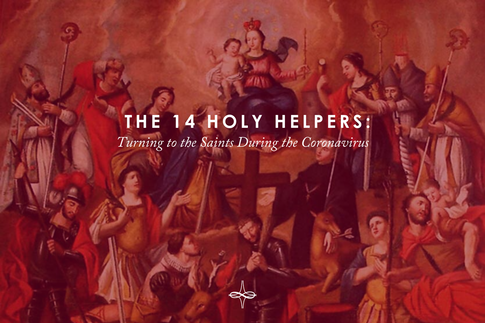


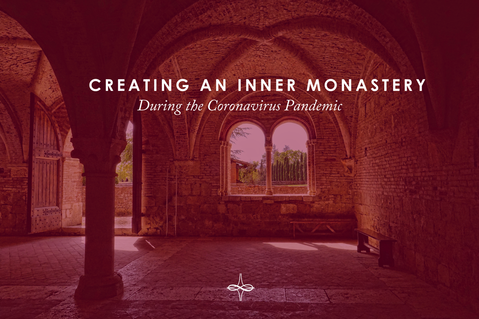

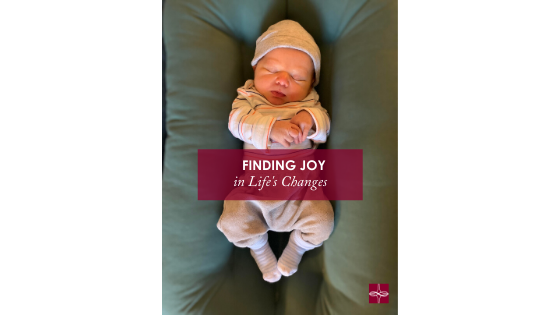







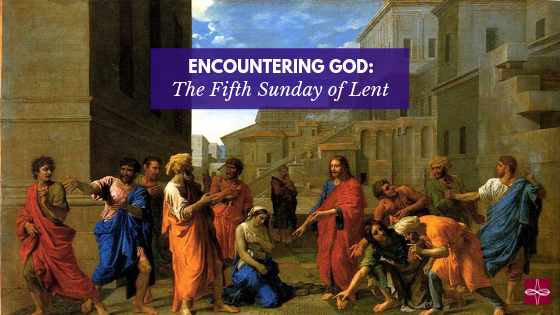

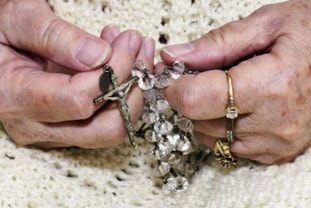
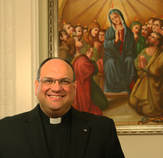
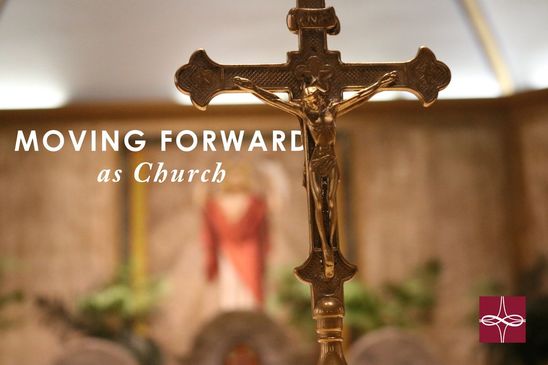
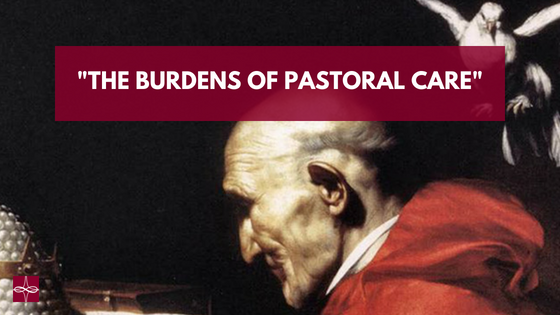

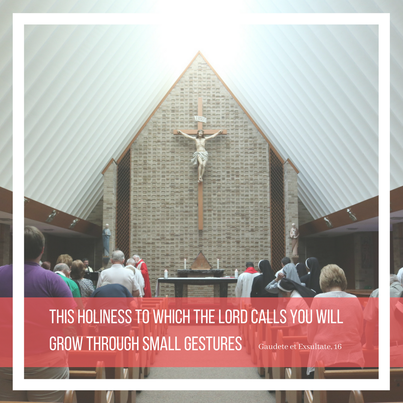
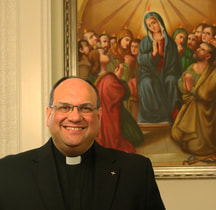
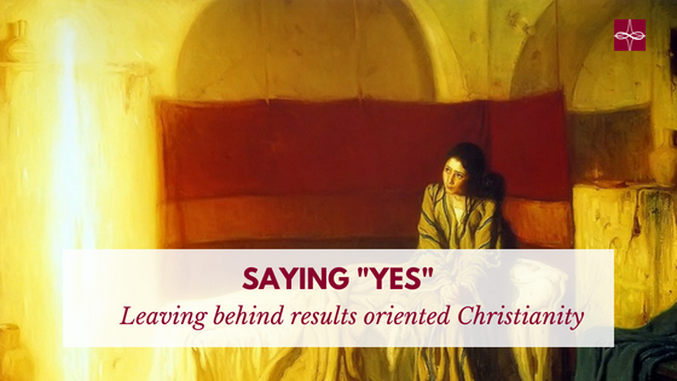

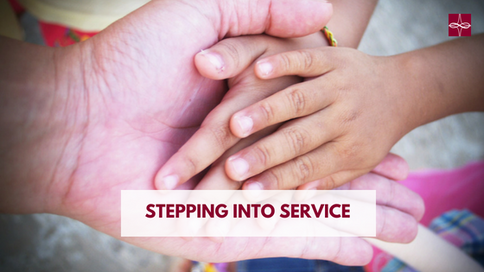
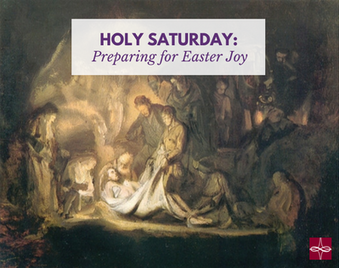

 RSS Feed
RSS Feed